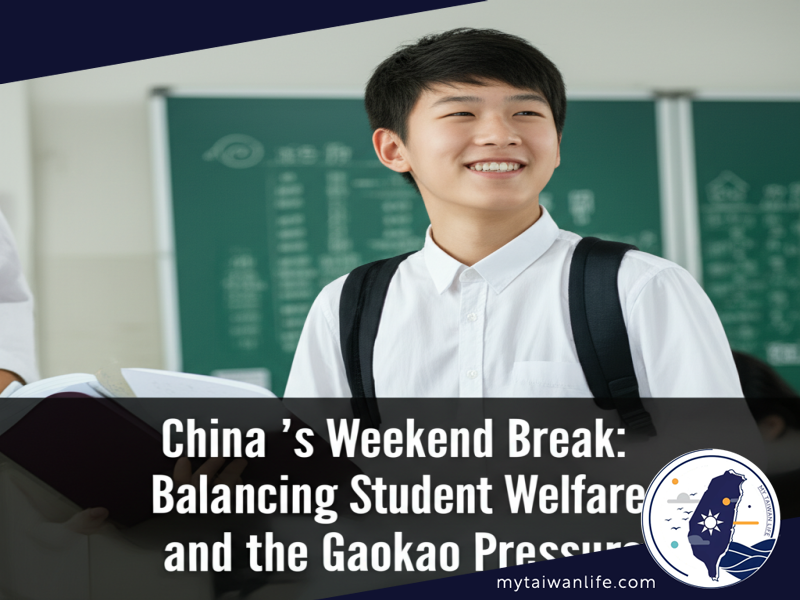China's Weekend Break: Balancing Student Welfare and the Gaokao Pressure
Education authorities enforce full weekend breaks for high school students, aiming to improve well-being. However, the pressure of the national college entrance exam, or Gaokao, creates a conflict of interest.

In China, a typical school day for high school students can begin as early as 7:30 am and stretch until after 9:40 pm, encompassing a grueling 14-hour study schedule. This demanding routine includes only two short breaks: a two-hour lunch recess and a one-hour dinner break.
This rigorous schedule reflects the reality for many students like Nian Nian, a second-year high school student in Yichun, Jiangxi province. "My days in school are spent doing almost nothing but studying," she shared with CNA.
However, Nian Nian and her peers now experience the "shuangxiu," meaning double rest, which translates to full weekends off.
While mandated across all Chinese high schools, the implementation of shuangxiu has been inconsistent. Following recent enforcement by education authorities, the issue has gained significant attention, particularly in anticipation of the Gaokao, the highly competitive national college entrance examination scheduled for June. This situation has exposed the challenges in balancing student well-being with academic performance, especially considering the Gaokao's role in shaping future opportunities.
The concept of a five-day school week in China dates back decades. A 1995 State Council circular mandated its implementation in primary and secondary schools. In 2022, the education ministry further specified that high schools should not hold classes or tutoring sessions during weekends. In recent months, the ministry has penalized several schools for violating these guidelines. As a result, some administrators in Henan were removed from their positions, schools in Jiangsu had their honorary titles revoked, and schools in Hebei were excluded from awards for three years.
Despite these efforts, many high schools across China, especially those with final-year students preparing for the Gaokao, continue to conduct weekend classes. It is common for these students to have only one rest day per week, or even one every two weeks. "No school is alike, even schools in the same districts have different practices," stated Nian Nian.
The Gaokao is often seen as a pivotal exam in China. Success can lead to prestigious universities and promising careers, while underperformance can limit college and job prospects.
This high-stakes environment creates immense pressure for students, parents, and teachers. This year, a record 14.4 million students will participate in the Gaokao.
Liu Changming from the Chinese Society of Education noted that intense academic pressure and long study hours have led to insufficient sleep and leisure time, potentially leading to academic burnout and psychological issues. Furthermore, according to a 2023 mental health report cited by state broadcaster CCTV, over 40% of high school students in China experience depression.
Retired high school teacher Li Shengli supports the shuangxiu approach. He believes it allows students to rest properly. "If they have classes from Monday to Saturday without a break, they get no breathing space," said Li, who taught politics in a high school in Shenzhen’s Futian district. Li, who retired last year after 40 years of teaching, added, "In my view, effective learning depends on students’ self-discipline.”
Li believes that with a two-day weekend break, students can identify their weaker subjects and address them. "I think this approach is quite good. I don't really agree with exhaustion-based learning strategies," he said.
However, Li also acknowledged the parental perspective, noting the fear of children "missing out" on their studies. “Third-year students do require breaks, they want the breaks. But from what I see, there’s still a difficulty in eliminating classes on Saturdays, and the pressure mainly comes from the parents.”
Li shared instances during breaks when some parents would request additional remedial classes for their children. “As teachers, we hope that the children get to rest," he said. "It’s heartbreaking to see the children exhausted … they may be physically present, they’re not fooling around, but their learning efficiency is plummeting.”
Other Versions
China's Weekend Break: Equilibrio entre el bienestar de los estudiantes y la presión del Gaokao
La pause du week-end en Chine : Équilibrer le bien-être des étudiants et la pression du Gaokao
Libur Akhir Pekan di Tiongkok: Menyeimbangkan Kesejahteraan Siswa dan Tekanan Gaokao
La pausa del fine settimana in Cina: Bilanciare il benessere degli studenti e la pressione del Gaokao
中国の週末休暇:学生の福利厚生と高考プレッシャーのバランス
중국의 주말 방학: 학생 복지와 가오카오의 압력 사이에서 균형 잡기
Pamamahinga sa Katapusan ng Linggo sa Tsina: Pagbalanse sa Kapakanan ng Estudyante at Presyur ng Gaokao
Китайские выходные: Баланс между благополучием студентов и давлением Гаокао
วันหยุดสุดสัปดาห์ของจีน: การรักษาสวัสดิภาพนักเรียนและการรับมือแรงกดดันจากเกาเข่า
Kỳ nghỉ cuối tuần của Trung Quốc: Cân bằng Phúc lợi Học sinh và Áp lực Gaokao

